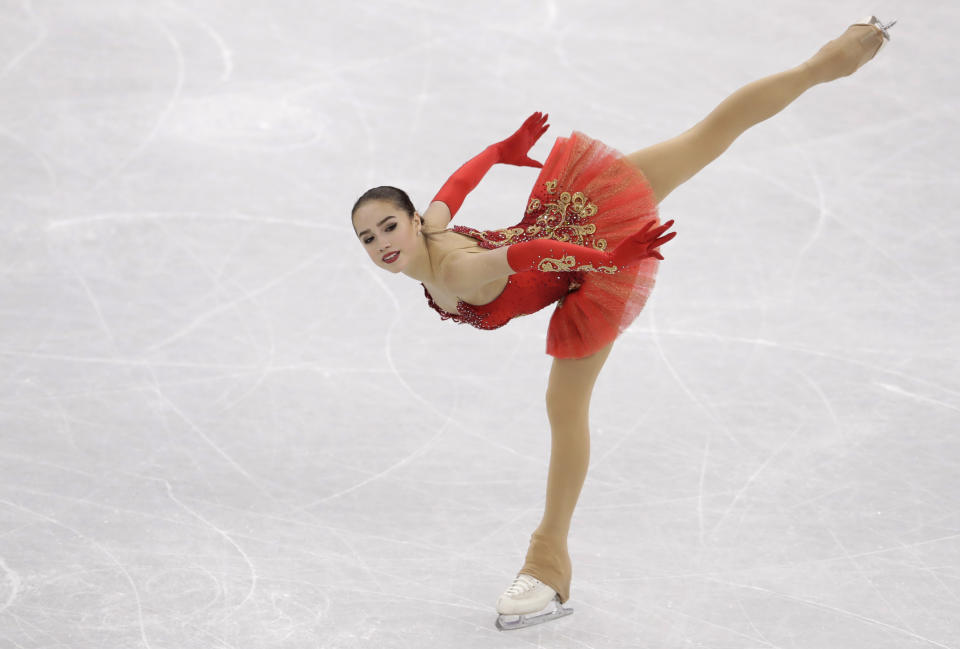How Alina Zagitova gamed the system en route to 'Russia's' first gold medal
GANGNEUNG, South Korea — For the first 2:10 of her not quite four-minute free skate routine here at the ladies’ final, 15-year-old Alina Zagitova spun, twirled, stepped and acted out a choreographed scene from “Don Quixote,” whose music played the entire time.
What Zagitova didn’t do was jump.
Those would come and those would come brilliantly, brilliantly enough that Zagitova would later win the gold medal. She won the game, though, by gaming the system … fair and square but still bizarre to see.
Under current International Skating Union rules, a skater gets a 10-percent bonus for all jumps completed in the final two minutes of their performance. The theory is that jumps done at that point deserve a bump because the skaters are tiring out, mainly because of jumps at the beginning of the performance. It sounds reasonable.
Then Zagitova came by and stuck a toeloop through the loop hole. Rather than tire out during her first two minutes, she essentially skates around, conserves energy by doing simple maneuvers and then packs the entire program into the last 1:45.
Why attempt a jump early, when you can just attempt it later and have it count for more?
It was many things, including controversial.

Mainly though, it was ingenious. Leave it to a teenager to win the Olympic Athletes from Russia’s first gold medal at these Olympics.
Zagitova edged out fellow Russian Evgenia Medvedeva, who won silver. Canadian Kaetlyn Osmond won bronze.
Zagitova’s performance went like this. The first 2:10, not much. There was choreography, a fly into a camel spin and a step sequence. If the crowd at the Gangneung Ice Arena dozed off, no one would have blamed them. Then came the action.
At 2:10, she threw a triple lutz-triple loop combo. At 2:23, a double axel-triple toe loop combo. At 2:38, a triple flip-double toe loop-double loop combo. At 3:06, a triple lutz. At 3:15, a triple salchow. At 3:25, a triple flip. At 3:34, a double axel. That’s seven jumps in 84 seconds. She later squeezed in a change foot combination spin and completed everything at 3:55 to a roaring audience and clearly impressed judges.
Zagitova scored 156.65, the same as Medvedeva. Since Zagitova led going into the day, she won gold, 239.57-238.26.
Then she defended her system, claiming it was about artistry.
“My program is very harmonious, I think,” she said. “In the beginning, I skate to slow music. And in the end, it speeds up and this is where I put my jumps. It captivated the audience. … People look forward to my jumps. I think it is a well-choreographed routine.”
It’s certainly successful. Anyone could do this. No one else does. The next 10 finishers averaged 2.7 jumps before the two-minute mark. Medvedeva did two. Osmond did three. Americans Karen Chen and Bradie Tennell attempted three each. Marai Nagasu tried four, although she bailed out of her signature triple axel.
Essentially everyone else was skating uphill.
That doesn’t mean it’s easy. Attempting all those jumps in a row requires its own unique level of conditioning. Nagasu said earlier this week she doesn’t know if she could even try it because the idea never really came. Top American coach Tom Zakrajsek said it’s clearly “the right program for Alina.”
Zagitova is a jumping machine.
Still, there are purists out there who prefer a more balanced program. The combination of athleticism and artistry is a major appeal of figure skating. Medvedeva excels in that. In Zagitova’s case, the parts are segregated.
She is capable of ripping off jump after jump after jump, though, without much of a break for rest or air. That’s her advantage. Why not exploit it? She’s always been patient. Her parents didn’t even give her a name until after her first birthday, settling finally on a Russian gymnast they were watching on television.
“It is in my character that the more difficult it is, the better it is for me,” Zagitova said.
Whether this was more difficult or just a lot smarter is the debate. It doesn’t really matter, though.
“All my supporters agree that it works very well,” she said.
Like it or loathe it or call for the rules to be changed, this kid from Moscow just rode it all the way to the top of the podium.
More Olympic coverage from Yahoo Sports:
• Disgusted Olympian quickly casts aside silver
• Vonn’s final tribute to late grandfather in South Korea
• Dominant Belarus biathlete’s secret past
• Team USA hockey hero plans big purchase with winnings
• U.S. men boot Canada for chance at curling gold

